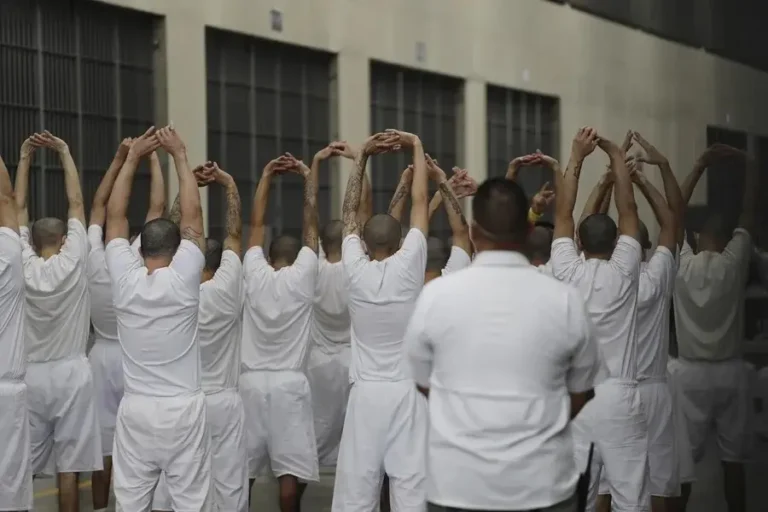Venezuela’s Moral Victory: Rescuing 252 Migrants from El Salvador

July 18, 2025 Hour: 4:31 pm
On Friday, July 18, Venezuela marked a significant triumph with the arrival of a group of migrants previously deported from the United States and subsequently detained in El Salvador.
This cohort, comprised of 252 individuals, is set to touch down at Simon Bolivar International Airport on Tuesday, where Venezuelan authorities are prepared to welcome them.
Related:
Venezuela Rescues 7 Children Kidnapped by the United States
Background of the Migration Crisis
The journey of these migrants has been fraught with hardship. Initially deported by the United States, they found themselves victims once more, this time at the hands of the Salvadoran government.
Interned in the infamous Center for Containment of Terrorism (CECOT), their plight drew international attention and condemnation.
The Venezuelan government stepped in, orchestrating a complex rescue operation that culminated in their safe return.
The Significance of the Rescue Operation
This event transcends the mere act of repatriation; it symbolizes hope and resilience against odds.
Venezuela’s government intervention signals its commitment to protecting nationals, asserting sovereignty, and challenging international migration/asylum norms.
President Nicolas Maduro’s administration has positioned this as a moral victory, highlighting the state’s dedication to safeguarding its citizens regardless of geopolitical hurdles.
This narrative is strategically amplified through state-controlled media, portraying Maduro as a steadfast leader who prioritizes the well-being of Venezuelans above external pressures.
The government’s actions are framed as a defense against foreign interference, reinforcing a sense of national unity and resilience in the face of ongoing challenges.
Simultaneously, critics argue that these actions are a smokescreen, deflecting attention from deeper structural issues and economic hardships that continue to plague the nation.
The government’s focus on external threats is seen as a power grab that suppresses dissent and ignores the country’s socio-economic problems.
The Plight of Migrants: A Closer Look
Migrants often face treacherous conditions, navigating perilous routes in search of better lives.
Their journeys are compounded by hostile policies, detention centers, and exploitation.
For the 252 Venezuelans, the ordeal began with deportation under President Donald Trump’s administration, followed by a harrowing stint in El Salvador’s CECOT.
Their return marks not only an end to their suffering but also serves as a poignant reminder of the broader struggles faced by migrant communities globally.
Community Mobilization and Advocacy
Coinciding with this rescue operation was a significant mobilization of Venezuelan citizens. On Friday, protests swept across the country, demanding the return of children detained in the United States under Trump’s administration.
This civic action underscores the intertwined fates of migrants and their families, highlighting the urgency for humane treatment and policies that respect human rights.
Arrival and Reception in Venezuela
As the 252 migrants arrive at Simon Bolivar International Airport, arrangements are in place to ensure their smooth reintegration.
Authorities have planned medical checkups, psychological support, and temporary housing to ease their transition. Families eagerly await reunions, and communities prepare to extend solidarity and assistance.
International Implications and Diplomatic Tensions
This episode adds another layer to the complex relations between Venezuela, the United States, and El Salvador.
The detention and subsequent rescue of migrants reflect broader diplomatic tensions and criticisms of how different nations handle migration issues.
Venezuela’s successful intervention casts a critical eye on the policies of others and invites discourse on the responsibilities of nations towards migrants.
Future Prospects and Policy Recommendations
For a sustainable resolution to migration crises, comprehensive policy reforms are essential. Countries must collaborate to ensure safe passage and humane treatment for migrants.
International bodies can play pivotal roles in monitoring and mediating conflicts arising from migration disputes.
Venezuela’s recent actions suggest possible pathways, emphasizing cooperation, respect for human rights, and the importance of diplomatic engagement.
Justice and Dignity
The return of the 252 migrants marks a poignant chapter in Venezuela’s ongoing narrative of resilience and advocacy.
Their arrival brings renewed hope to all who fight for justice and dignity.
As these individuals reunite with their families and rebuild their lives, their story serves as a powerful testament to the strength of human spirit and the imperative for nations to uphold humanitarian principles.
Author: Manuel F. Diaz
Source: teleSUR



